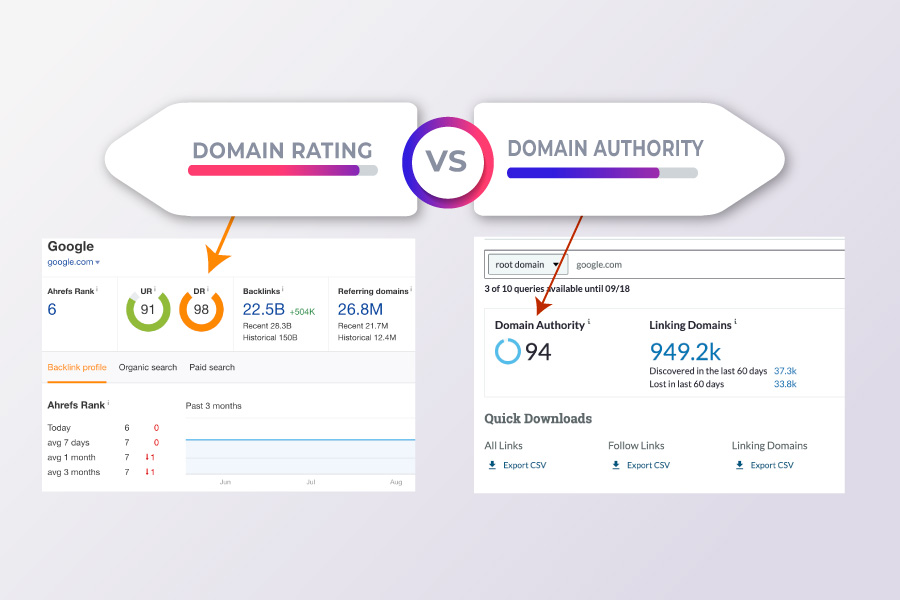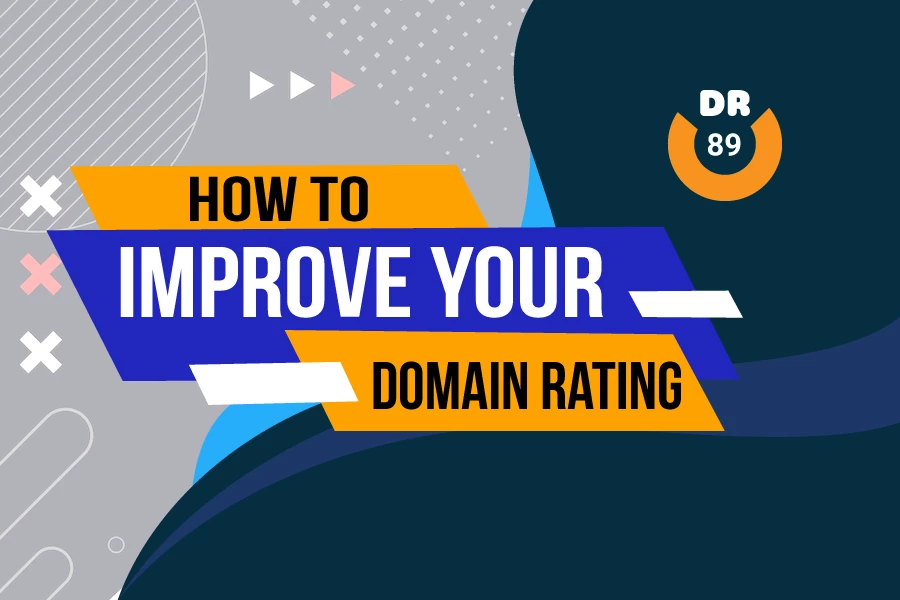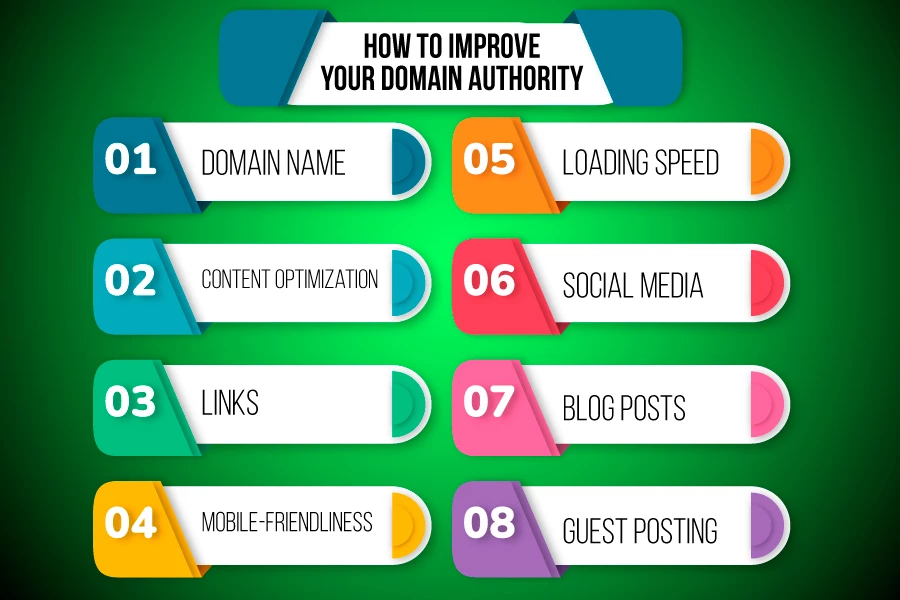There is much debate in the SEO community as to which metric is more important: domain rating vs domain authority.
Both of these metrics are essential for analyzing how visible a website will be with search engines and users.
While both metrics provide insight into different aspects of a domain, one may be more important than the other, depending on your goals for your site. So, which is more important?
Domain Rating Vs. Domain Authority
The answer may depend on your specific needs, but in general, we believe that domain rating is a more important metric than domain authority. This is because Domain rating is a more holistic measure of link strength.
It considers the backlink quality of a website, whereas domain authority only looks at the number of links. This makes domain rating to be a more accurate predictor of search engine rankings.
Domain rating (DR) is a metric started by Ahrefs, estimating a website’s backlink quality. It is based on several factors, including the strength of a website’s backlink profile and the count of referring domains, as well as the page content.
Domain Authority is a ranking score between 1 and 100 that google uses to measure the Authority of a website or webpage.
A high domain authority score indicates that the site has good page content, attracting more visitors.
A low domain authority score suggests that there is a shortage of good quality content on that site.
How To Improve Your Domain Rating
A domain rating is a useful tool for website owners and searches engine optimizers to determine whether or not your page meets users’ needs.
A high domain rating is good for you because it means that Google searches view your site as reputable and trustworthy.
This may lead to higher search results for your business. On the other hand, if you see a low domain rating from Google, it might be cause for concern. You can improve your domain rating with the following tips;
2. Get High-Rated Backlinks from Authority Sites
Google calculates your page’s domain rating based on the quality of your backlinks. If a website linking to your page doesn’t have a high domain rating, it can negatively affect your ranking.
To boost your domain rating and avoid losing rank, focus on acquiring high-quality backlinks from authority sites.
Authority sites like Wikipedia are generally trustworthy and credible. If their Domain rating is high, so is your site.
3. Create engaging content for your users
Your domain rating, like other SEO measures, is based on how well your site meets the needs of users.
Google considers the number of people who click on your site and those who stay on the page. It also considers the number of people who click the back button and those who click off your page.
You may have problems with your website if you notice more people clicking off than staying. Try fixing these issues by boosting your domain rating by creating engaging content for users on your page.
To do this, you need to know what your audience wants. Research what topics your potential customers are interested in. Use these findings to inform your content and ensure it meets user needs.
If your content is relevant and helpful, Google will boost your domain rating and make your site more prominent on the search results page.
4. Get Rid of Broken Links from Your Website
Bad links are bad for your domain rating and can also be dangerous to your site. To keep your site safe and secure and your domain rating high, remove bad links from your site and report them to Google.
You can do this by using Google’s Disavow Tool. You can also fix links previously reported as bad and mistakenly removed. If you see that your domain rating is starting to drop, check your backlinks and remove bad links.
5. Optimize User Experience and Website Structure
A website with a high domain rating is clear, concise, and easy to navigate. It’s broken down into different sections and has a logical flow.
Your site should feel easy and pleasurable to use because when it works well, Google likes it too.
To help your site climb in the rankings, optimize your page layout and user experience. Start by mapping out your site’s architecture, paying special attention to the hierarchy. This is the order in which information appears on your page.
Highlight your most important sections and give them priority on your page. Next, make sure your site is easy to navigate.
Create a sitemap that clearly outlines your site’s structure and provides directions for easy navigation.
6. Enrich Your Content With Internal Links
A high domain rating isn’t just about the links coming into your website. It also includes the links that lead to other pages on your site. Like other SEO measures, your domain rating is affected by how trustworthy your links are.
If your links are low-quality, they can negatively affect your domain rating. To boost your domain rating, ensure your internal links are relevant and helpful. Put your best content at the top of your pages and link to it.
Ensuring your links are up to par doesn’t just help your domain rating. It can also help with your click-through rate. By taking these steps, you can improve your domain rating.
How To Improve Your Domain Authority
Did you know that improving your DA can increase your visibility in search engines? Improving your Domain Authority is a vital step in improving your website’s organic traffic. So, how can you improve your Domain Authority?
1. Perfect Your Off-Page SEO
Off-page SEO refers to all things outside your direct control regarding SEO. This includes things like link building, social media sharing, guest blogging, and more.
What’s important to know here is that many factors go into determining your site’s Domain Authority. And many of these things are off-page factors that can be out of your control.
For this reason, it’s best to start working on your off-page SEO as soon as possible. If you’re new to SEO, you can start by building links to your site. By doing this, you’ll start to increase your DA over time.
There are many ways to start building links. You can get recommendations from friends, approach bloggers, and influencers in your industry, or join a forum or online community.
2. Optimize Your On-Page SEO
On-Page SEO refers to the things you can control on your site, including your content, site structure, URL, and more.
Optimizing your on-page SEO makes it easier for search engines to profile the contents of your website.
There are many firms that can help you achieve optimum SEO for your page. The Michigan SEO is one of the best players in the industry.
If well done, On-page SEO can also help search engines understand the language of your content. This can have a positive impact on your ranking.
3. Make Your Website Responsive
Google has been actively pushing for websites to become mobile-friendly. And in fact, they’ve been promoting this concept in search results since 2015.
This means that Google’s algorithms have been favoring websites that are friendly to mobile devices.
And they’ve been demoting websites that don’t adapt well to mobile devices. Google has been actively lowering the Domain Authority of websites that aren’t mobile-friendly.
Why? Because Google wants to make sure that the most important content on their results is mobile-friendly and easy to find. And if your site isn’t responsive, it will rank low in Google’s results.
4. Improve your Page Speed
Another factor that Google uses to measure your domain Authority is your site’s load speed. The good news is that you can control this factor and optimize it to your advantage.
You can optimize your images, remove unnecessary plugins and CSS, optimize your hosting, and more.
And since Google is actively trying to lower the DA of slow websites, you can improve your SEO by optimizing your page speed.
5. Boost Your Social Signals
Google also looks at social signals when determining your domain Authority. Social signals are things like how often your website is shared, how many followers you have on social media, and more.
You can improve your DA over time by actively working on increasing your social signals. If you have time, you can start by creating a strategy to get more followers on your social media platforms.
If you have limited time to create a strategy, you can utilize social platforms like Crowd fire to get more followers.
Conclusion
The contrast between domain rating vs. domain authority is no absolute winner since both factors contribute to your page’s ranking.
It is essential to have a high Domain Rating and Domain Authority to rank higher on search engine results pages.
In ranking websites with a high DA and DR, Google uses different factors, including the number of backlinks from other website pages, the number of indexed pages on your website, the number of social shares, and the number of comments on your website.







